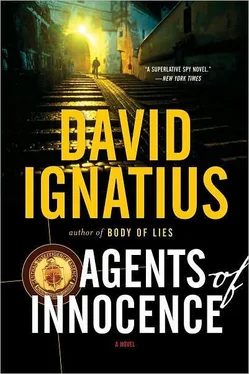David Ignatius - Agents of Innocence
Здесь есть возможность читать онлайн «David Ignatius - Agents of Innocence» весь текст электронной книги совершенно бесплатно (целиком полную версию без сокращений). В некоторых случаях можно слушать аудио, скачать через торрент в формате fb2 и присутствует краткое содержание. Жанр: Шпионский детектив, на английском языке. Описание произведения, (предисловие) а так же отзывы посетителей доступны на портале библиотеки ЛибКат.
- Название:Agents of Innocence
- Автор:
- Жанр:
- Год:неизвестен
- ISBN:нет данных
- Рейтинг книги:3 / 5. Голосов: 1
-
Избранное:Добавить в избранное
- Отзывы:
-
Ваша оценка:
- 60
- 1
- 2
- 3
- 4
- 5
Agents of Innocence: краткое содержание, описание и аннотация
Предлагаем к чтению аннотацию, описание, краткое содержание или предисловие (зависит от того, что написал сам автор книги «Agents of Innocence»). Если вы не нашли необходимую информацию о книге — напишите в комментариях, мы постараемся отыскать её.
Agents of Innocence — читать онлайн бесплатно полную книгу (весь текст) целиком
Ниже представлен текст книги, разбитый по страницам. Система сохранения места последней прочитанной страницы, позволяет с удобством читать онлайн бесплатно книгу «Agents of Innocence», без необходимости каждый раз заново искать на чём Вы остановились. Поставьте закладку, и сможете в любой момент перейти на страницу, на которой закончили чтение.
Интервал:
Закладка:
“Of course I do,” said the general. “That is my job.”
“We hope that you share our concern.”
“That is a different matter,” said Jezzine. “My concern is for the future of Lebanon.”
“May I ask you a question?” said Rogers.
The general nodded his head.
“Why do these organizations exist?” pressed Rogers. “What is their purpose?”
“They exist because of the dangerous prospect I spoke of a moment ago. The prospect that the power of the army, represented by the Deuxieme Bureau, will be destroyed in the next election, leaving this country at the mercy of its enemies. In that event, it will be necessary to supplement the power of the army with private groups. Groups that can do things that the army, in a divided country like ours, cannot do.”
“What things?” pressed Rogers.
“I will leave that to your imagination. Let us simply say: things that are part of the reality of warfare, but cannot be publicly admitted.”
“That sounds dangerous to me.”
“You are not a Lebanese.”
“Let me put my cards on the table,” said Rogers. “The embassy wants to know more about these Christian underground groups. I have come to make a request: that you share with us whatever information you have on this subject.”
“Why don’t you just steal it from us?” asked the general. “We know you have your own agents inside our service. You won’t even need to steal it. We’ll probably give it away free.”
“I’m not talking about what we can get from file clerks,” said Rogers. “We don’t need any more telephone taps or stolen documents. We want what isn’t in the files. The things that people won’t talk about on the phone or put in writing but will tell you privately, because they trust you.”
“Impossible,” said the general.
“Why?” asked Rogers.
“Because I don’t agree with what you are doing. Why should I help you analyze the symptoms when I want to cure the disease?”
“What do you mean?”
“If you want to prevent the growth of underground terrorist organizations among the Christians, then help our side in the election. We are the alternative to that sort of anarchy.”
“We cannot do that,” said Rogers. “I have already explained that our policy is to remain neutral.”
“Then I refuse to help you destroy the secret weapons that we may need someday to protect Lebanon.”
Rogers began to speak again, making the same request in a different way, but General Jezzine cut him off.
“We will not speak about this subject again,” said the general coldly. His manner changed, as quickly and completely as if he had changed his clothes.
“I believe it is time for lunch,” said the Lebanese intelligence officer, leading Rogers through two large oak doors into a formal dining room.
Rogers took his place at the long dining table, which was set with the heaviest silver knives and forks he had ever hoisted. On his right was Madame Jezzine. She was wearing a black dress with a plunging neckline and a heavy gold necklace. The gold ornament gleamed above her bosom like a mark of ownership.
Madame Jezzine was as charming and flirtatious as Rogers had remembered. She resumed the conversation they had begun nearly a year ago at the ambassador’s house, as if the intervening months had been no more than a trip to the powder room.
“We were talking of the differences between my country and Lebanon,” said Madame Jezzine.
“You have a good memory,” said Rogers.
“I thought later,” she continued, “of one difference that would perhaps help you to understand all the others.”
“I would like to hear it.”
“The best way to explain it is for me to ask you some questions. Yes?”
“Yes,” said Rogers.
“In America, what kind of houses did your pioneers build?”
Rogers thought a moment.
“Wood, mostly,” he answered.
“Of course! That is what we read in all our histories of America. Your famous pioneers exploring the vast continent, building their famous log cabins. Living in one for a few years and then moving on to build another log cabin somewhere else. That is our picture of America: a land of fields and forests and houses made of wood. Is it accurate?”
“Yes, I suppose it is,” said Rogers. He found the Lebanese woman irresistible.
“Now,” she continued, “what kind of houses do we Lebanese build?”
Rogers looked at the walls of the Jezzine house, and through the window at the houses of the village. Every single one was built of the same material.
“Stone,” said Rogers.
“Correct!” said Madame Jezzine. “Now what does that tell you about the Lebanese? It tells you that we build our houses to last forever. A Lebanese man builds the house that he will die in, that his sons and grandsons will die in. He may go away to work in Africa or even America. But he will always come home to that stone house. For him, there is nothing else on earth except his house and his village.”
“I see your point.”
“Do you?” asked the Lebanese woman. “Are you sure that you do? Imagine for a moment what this man in his stone house will feel if he suddenly sees other people in his midst, who have come into his country and are building houses of their own in the shadow of his village. Do you think he will feel threatened?”
“Who might these newcomers be?” asked Rogers, already knowing the answer.
“The Palestinians, of course!” said Madame Jezzine. “As I told you once before, they are destroying my country.”
Their conversation was interrupted by an attractive woman sitting across the table, next to General Jezzine. She was a cousin visiting for the day, and she was dressed in the most exquisite summer outfit of silk and jade and pearls.
“Did you hear the news on the radio this morning?” asked the woman slyly. There was a look of pure malice on her face.
“No,” said Madame Jezzine.
“There was a bomb in one of the Palestinian refugee camps.”
“Was anyone killed?” asked General Jezzine.
“Malheureusement, no,” said the cousin. “Perhaps next time.” That was her joke. She laughed and put one of her long slender fingers delicately on the strand of pearls around her neck.
A waiter arrived with a tray piled high with roast quail, which had been shot by one of the general’s sons. Madame Jezzine turned to Rogers and said quietly: “Do you see what I mean?”
Rogers nodded.
There was gay banter around the table. Rogers got into a conversation with a young man seated on his left, who was married to the well-dressed cousin. He was a smooth, carefully groomed young businessman who was working in Saudi Arabia. His name was Elias, and he seemed to have many political contacts in Lebanon and abroad. He made rude comments about the Saudis and their backwardness through much of the lunch.
When the meal was nearly done, Rogers turned back to his hostess. He spoke quietly, so as not to be overheard by General Jezzine.
“Suppose I wanted to understand better the views of the Lebanese Christians,” said Rogers. “Who would you suggest that I go see?”
Madame Jezzine deliberated for a moment.
“My confessor,” she said softly. “Father Maroun Lubnani.”
“Where is he?” asked Rogers.
“Kaslik!” boomed a voice from across the table. It was the voice of General Jezzine. The usually stone-faced man was smiling.
22
Beirut; July 1970
Rogers travelled several nights later to the University of the Holy Ghost at Kaslik. It was a spectacular drive up the coastal highway, through East Beirut and the harbor of Jounie. There was a full moon out, painting a silvery beam across the Mediterranean and casting faint shadows within the dark stone cloisters of the university. It was an eerie landscape, drawn in shades of black, like a photographic negative come to life.
Читать дальшеИнтервал:
Закладка:
Похожие книги на «Agents of Innocence»
Представляем Вашему вниманию похожие книги на «Agents of Innocence» списком для выбора. Мы отобрали схожую по названию и смыслу литературу в надежде предоставить читателям больше вариантов отыскать новые, интересные, ещё непрочитанные произведения.
Обсуждение, отзывы о книге «Agents of Innocence» и просто собственные мнения читателей. Оставьте ваши комментарии, напишите, что Вы думаете о произведении, его смысле или главных героях. Укажите что конкретно понравилось, а что нет, и почему Вы так считаете.












